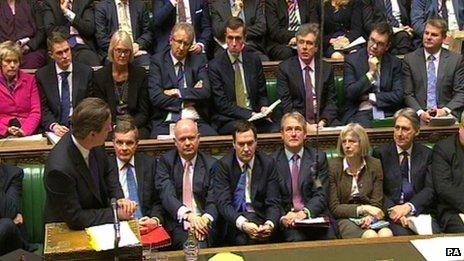Why are 95 Conservative MPs backing calls for EU veto?
- Published

David Cameron is playing for time on a number of European issues
The decision by 95 Conservative MPs to sign a letter demanding that Parliament should have the power to veto EU law unilaterally has left ministers scratching their heads with astonishment.
They believe such a change would make it impossible for the European Union to work.
They say it would lead to legislative gridlock, a failure of the single market and an end to free trade as national parliaments adopted protectionist policies across the union.
So why have so many MPs supported this letter? Having spent the day talking to ministers and MPs, they divide the signatories into the following categories:
1. The malicious - those Conservative MPs who are just bent on giving David Cameron grief, come what may.
2. The withdrawalists - those MPs who privately want to take Britain out of the EU and are adopting a position like this because they know it is ultimately incompatible with EU membership.
3. The worriers - those Tory MPs who know this policy is unworkable but feel they have to sign letters like this to try to keep UKIP at bay in their constituencies ahead of the European elections in May.
4. The pushers - those Tory MPs who know that when pushed, Mr Cameron changes his mind on Europe and want to push him again. They accept they won't get a national parliamentary veto but they might pressurise No 10 into doing more, say, on benefit curbs for immigrants.
5. The thick - those Tory MPs too stupid to understand the implications of a unilateral parliamentary veto, thinking it might be just a tougher version of the "red card" system being considered by the government whereby a group of national parliaments could block European commission proposals.
For now, the signatories of the letter have their tails up, emphasising what a large proportion of the non-payroll Conservative parliamentary party they represent.
They say they have repeatedly got more from David Cameron whenever they have put him under pressure and they are determined to keep going.
And they are deeply irritated by William Hague, the foreign secretary, calling their plans "unrealistic".
Other Tory MPs who have not signed the letter are concerned. They fear that the demand for a national parliamentary veto is so outlandish that it will queer the pitch for other potential reforms, such as those being sought by the Fresh Start group of MPs at a conference in London this week.
So for now, David Cameron is playing for time.
1. First, I have learned that the government is delaying its response to the unanimous European Scrutiny Committee report which first recommended a national parliamentary veto and was the intellectual heft behind the 95 Tory MPs' letter.
This report was published on 20 November 2013. The Foreign Office is supposed to give a formal government response to the committee within two months and the formal deadline is 28 January.
But the FCO has now written to the committee asking for an extension because it wants to give "this important report the full consideration it deserves".
The committee has accepted an extension but has told the FCO that it must respond "as soon as is reasonably possible". Thus is the government buying time.
2. Second, the government is delaying the Immigration Bill to avoid a fresh confrontation with Tory MPs. The bill finished its committee stage on 19 November and the government has yet to give a date for its report stage.
It certainly won't come back for the next two weeks and one MP close to the process said he was not expecting to see it until after the February half term.
Some 70 Conservatives have backed a new clause tabled by Nigel Mills for the report stage of the Bill. This new clause would reintroduce the controls on Bulgarian and Romanian immigrants that were lifted on 1 January and extend them until 2018.
Again, like the national parliamentary vote, this delay would breach EU freedom of movement laws unless all member states agreed to a treaty change.
I am told that some officials had hoped that the new clause would be out of date because 1 January has come and gone.
But procedural experts in the House of Commons say that a minor tweak is all that might be needed and would make no difference to whether the amendment is ultimately called. So now Downing Street is looking for a way out, hoping to find something to offer Tory MPs so it can avoid a hugely embarrassing defeat.
The bottom line is that the Tory truce over Europe appears all but over. The prime minister's promise a year ago of an in-out referendum in 2017 on a reformed EU united his party around a process but not a policy.
And it is around policy that the fractures are emerging.
Mr Cameron will one day have to set out his ambitions and aims for reforming Britain's relationship with the EU. This will form the basis of the next Conservative manifesto.
But in the short term, while we await this negotiating position, Tory MPs and others are filling the void with their own demands. And those demands will only get more vocal if the Conservative party does poorly in May's European elections where UKIP is expected to do well.